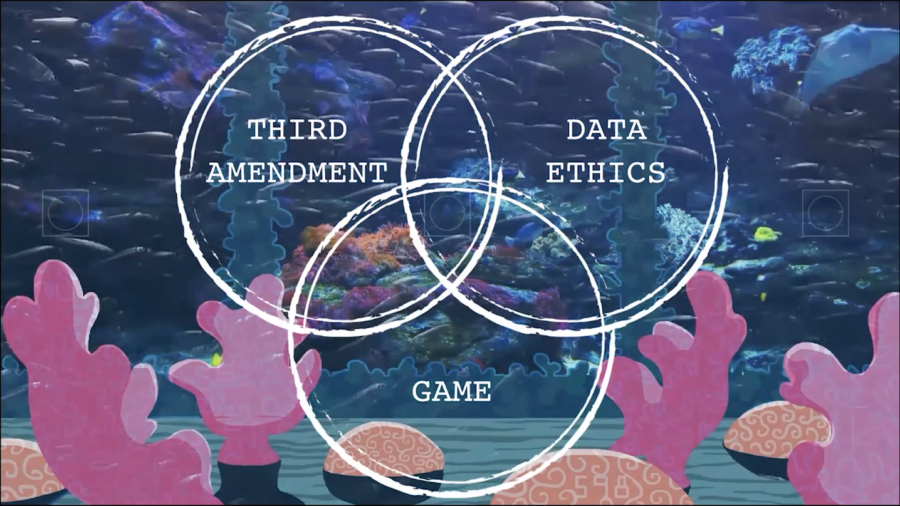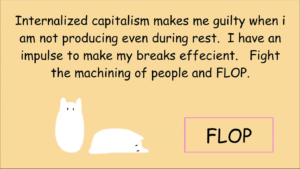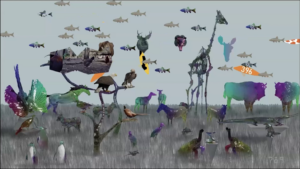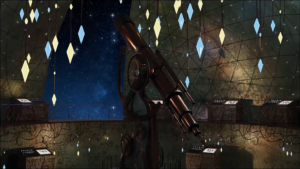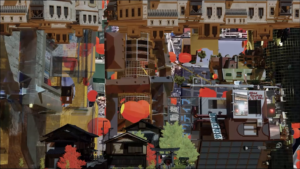Golan Levin: Welcome back to Shall Make, Shall Be. Our next speaker is Vi Trinh, whose commissioned project considers the Third Amendment. Vi Trinh works in digital and traditional media to examine the relationship between ecological and social patterns. A Vietnamese-American artist based in Washington, DC, Trinh graduated from the University of Richmond in 2019 with a BA in Visual and Media Arts Practice and Leadership. She’s currently an MFA Fine Arts Candidate at Goldsmiths University of London.
Much of Trinh’s work is based in and on the Internet. Through her interactive digital art, Trinh explores dynamics of power and control, freedom and restraint, and how they manifest in networked media. Themes in Trinh’s work include aesthetics in ecological emergency, new temporal realities created by very large phenomena, and the contradiction between the Internet as a seemingly free and democratic space and the reality of the Internet as a site of exclusionary design, extractive corporatization, technologized colonialism, and the perpetuation of white supremacy.
Friends, please welcome Vi Trinh.
Vi Trinh: Hi everybody. It’s so wonderful to be here. I’m going to start my presentation now.
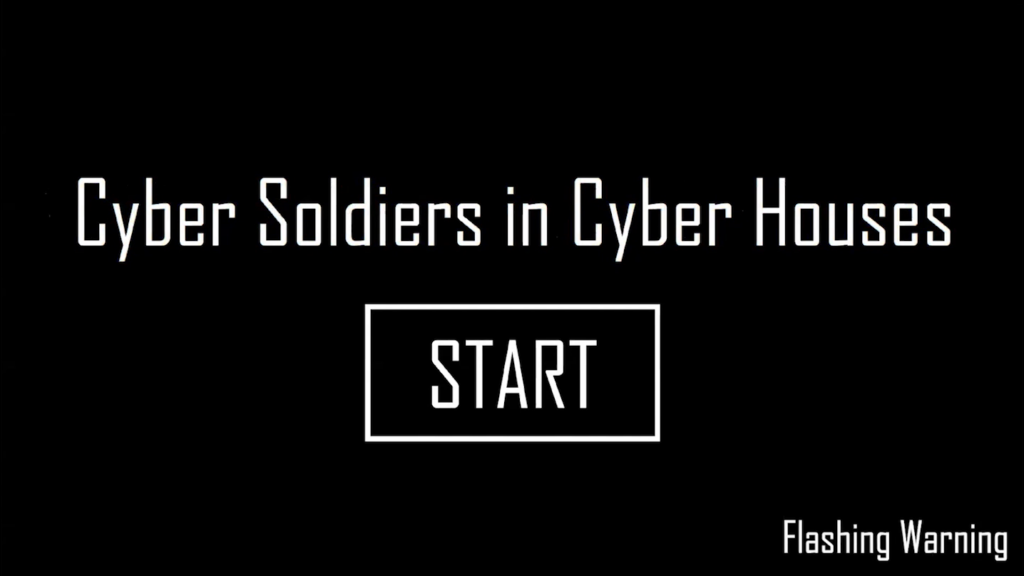
Thank you everybody for being here. So my project for Shall Make, Shall Be is called Cyber Soldiers in Cyber Houses, and it’s based off of the Third Amendment.
A little bit about me. First of all I’m actually currently based in London because I’m in my Master’s program at Goldsmiths, in my first year. But before I talk about the project I’d like to talk a little bit more about my previous practice and the context that sort of brings to Cyber Soldiers in Cyber Houses.
So my first project, the project immediately preceding Cyber Soldiers in Cyber Houses was a series called The Bunker Series. And The Bunker Series is a series a post-apocalyptic interactive Internet art pieces that take place in various bunkers. And players explore these bunkers through various rooms that reveal more and more about the people who built the bunkers.
The first piece in the series is called Escape. And Escape takes place in an underground bunker and is based off Plato’s allegory of the cave, and deconstructs exclusionary aesthetics, and guilt and responsibility at the end of the world. The second piece is called The Station, and The Station takes place in a space station, obviously, and is based off of the myth of Sisyphus and functions as a critique of nostalgia as a weapon of ideology, specifically against historically marginalized people. And the third piece from the series was called Atlantis. And Atlantis is based off of Plato’s Atlantis and takes place underwater, and explores an optimistic post-apocalyptic society. Because I sort of made this piece during the pandemic and all the post-apocalyptic sadness was really getting to me. And Atlantis was also the first 3D piece with 3D modeling and 3D movement of the player.
And so all these pieces sort of feature narration from two AI characters that are in conversation with each other, and that serve as mouthpieces of their creators’ ideology. And so Cyber Soldiers in Cyber Houses, or the Shall Make, Shall Be project that I’m doing, was created with the sort of same form and template, featuring something akin to a bunker and featuring narration from two AI characters. And so The Bunker Series was really my first foray into digital interactive Internet art. And the series started in 2019. And ever since then I’ve sort of continued down this dark path of digital Internet art. Which has continued, actually, into both the Shall Make, Shall Be project and this current project and I’m working on that was sort of a direct response to the Shall Make, Shall Be project.
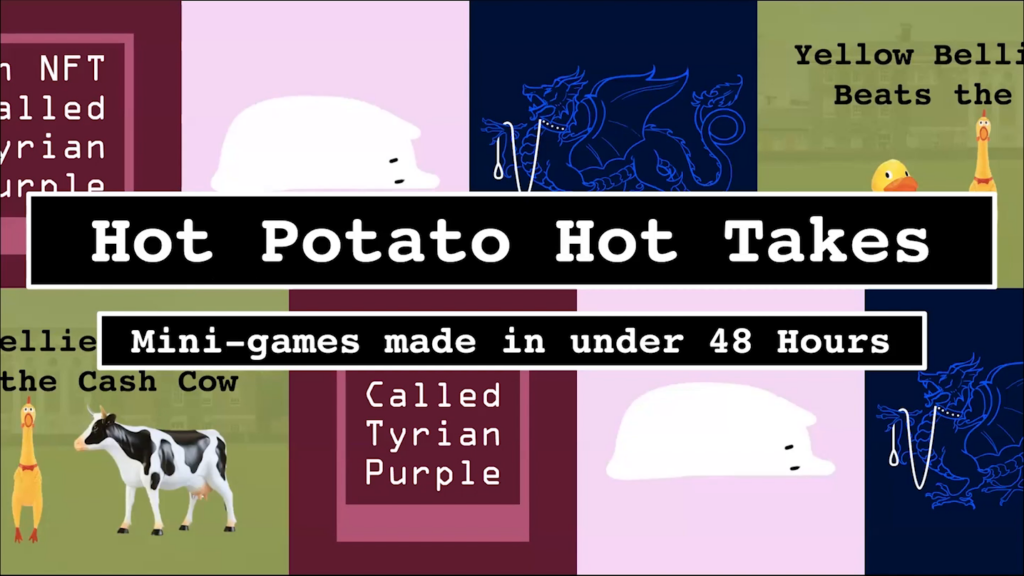
So, my current series is called Hot Potato Hot Takes. And it’s a series of Internet-based mini-games, and each game is made in under forty-eight hours. It’s very new and is currently ongoing. And each game is sort of like this very nostalgic point-and-click sort of Flash-esque games that all exist on the Internet as free and open access pieces.
The first game is called The Yellow-Bellied Chicken Beats the Cash Cow. And it’s a response to the Goldsmiths staff strikes, the staff strikes there against redundancies being made by the administration. And the game features a rubber chicken, a rubber duck, and a striking herd of cash cows.
The second piece is called The Algorithmic Dragon Holds its Own Leash. And actually this piece is based off of the research that I did for Cyber Soldiers in Cyber Houses. And it features an algorithmic dragon, a knight, a competitive leviathan, and a leashed hydra.
The third game is called Flop, and it’s an effort to fight internalized capitalistic impulses of my own, where rest does not need to be productive. And it features a bunch of rolling rabbits.
And the last piece in the series currently is called An NFT Called Tyrian Purple. And this game is not an NFT, it is a criticism of the NFT and fraudulent systems.
So Hot Potato Hot Takes is an effort on my part I think to loosen up the process of making interactive pieces, not perfect but done in an effort to shake off stagnancy and to respond with more authenticity and less academic distance. A sort of journal or sketchbook rather than a curated exhibition. And it’s a response to my previous way of making video games that does not allow for much improvisation or free creativity, while also allowing viewers to also experience a game with no stakes and no expectations. It’s somewhat of a small, insignificant experience for each player.
The series was a direct response to the process of Cyber Soldiers in Cyber Houses. And I intend to continue both ways of making this work in the future, to sort of balance both carefully-considered, contemplative works as well as making impulsive and whimsical pieces.
I’m also making installation sculptures sort of that combat my terrible computer posture. But that’s for a little bit later.
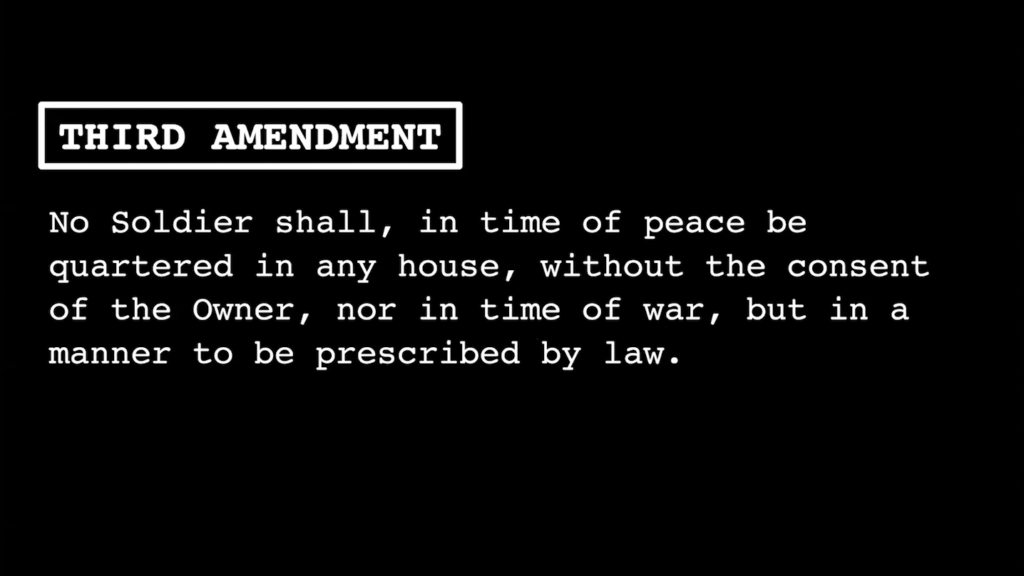
So the actual project Cyber Soldiers in Cyber Houses is based off of the Third Amendment, which states that No soldier shall, in time of peace be quartered in any house without the consent of the owner, nor in time of war, but in a manner to be prescribed by law.
And so the Third Amendment historically was created in response to British soldiers forcibly staying in citizens’ homes during the Civil War.
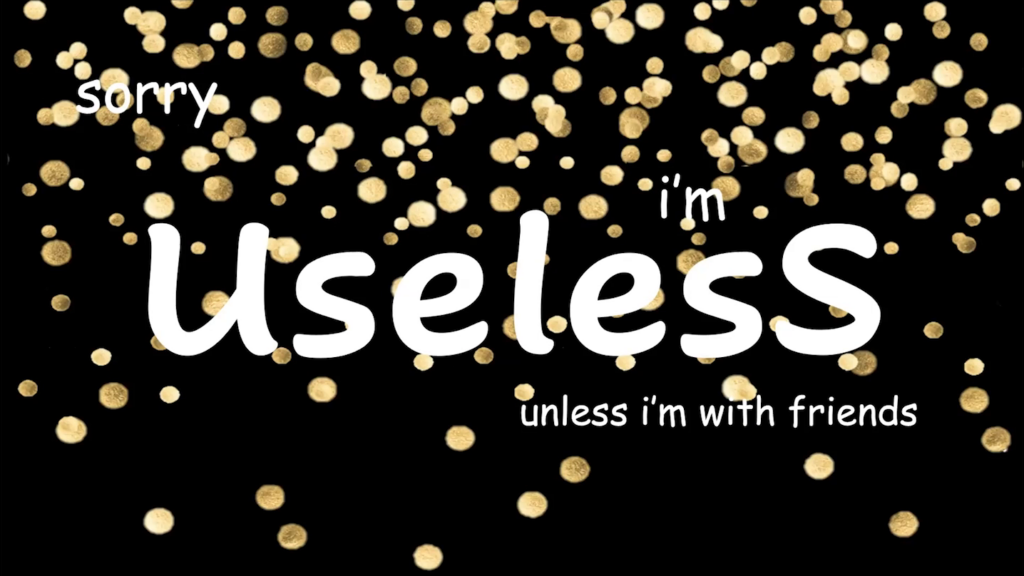
Legally, the Third Amendment is what lawyers I think would call “functionally useless.” So, no Supreme Court case has relied on the Third Amendment as the basis for a decision. Sometimes it gets thrown in with the bigger ones to fill out the lineup, as in the case of Griswold v. Connecticut, where it was listed alongside the First, Fourth, and Ninth, where the Supreme Court upheld the right of privacy in marriage.
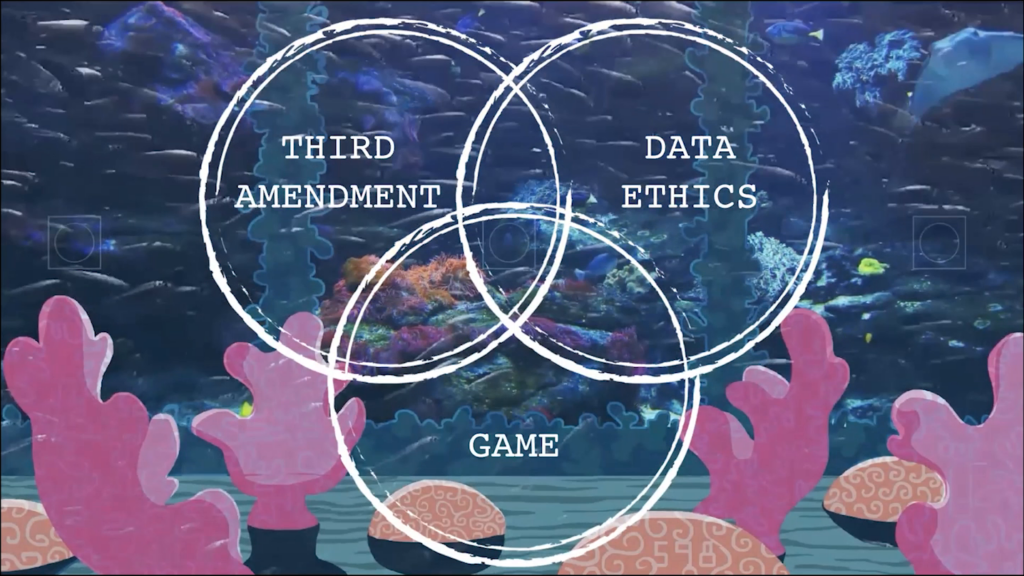
And so this lack of precedent allows us to sort of focus on the essential and theoretical implications of the amendment rather than this dense legalese I think that many of the other games might focus a little more on. It’s more about interpretation rather than precedent.
And so what struck me first about the Third Amendment is that it’s the only part of the Constitution that deals directly with the relationship between the rights of individuals and the military in both peace and war. And the amendments were written during a different time. So how do we apply these laws to present situations, especially in the case of new technological advancement.
Modern war and the modern military has extended I believe far beyond the reaches of the original conception of the Third Amendment. And so today rather than soldiers we have drones; instead of spies we have malware. I was fascinated by gaps in law, especially how law lags behind current events. Before laws, there are norms, and I’m extremely interested in how these norms crystallize therefore into law. Our laws are based therefore on the conception of physical space when they were first written. An so how do we apply these laws in cyberspace? How do we cope with unprecedented tools with unprecedented influence? How are pre-existing power structures being influenced by new technologies such as big data? And how does new technology uphold old infrastructures of inequality?
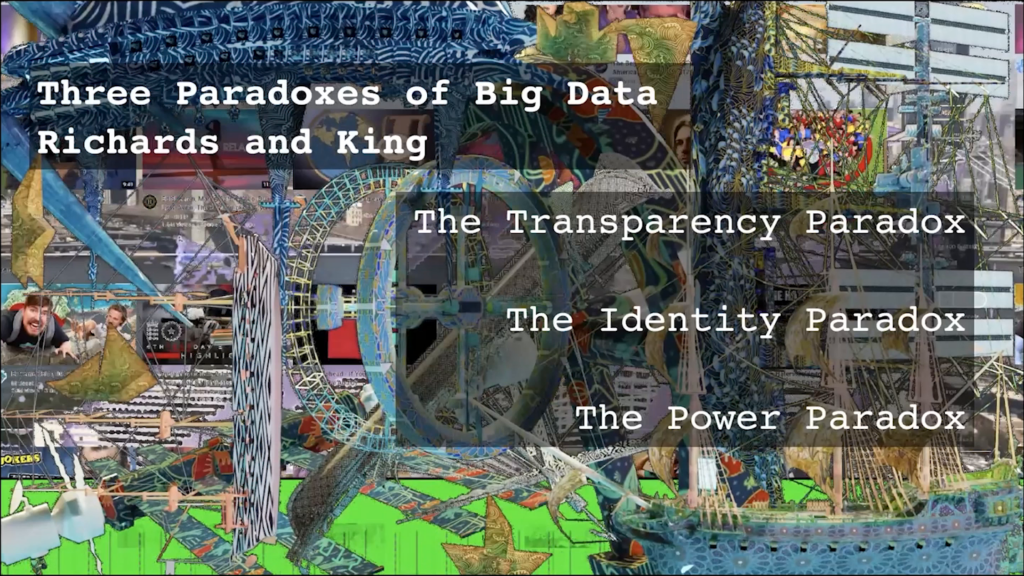
So, sort of one of the main pillars of my research and of the project, were the Three Paradoxes of Big Data by Richards and King. And so they detail three different paradoxes. The first is the Transparency Paradox, which is the increase of information on individuals without the individuals’ knowledge. And then there’s the Identity Paradox, which is the movement from identifying the individual to defining the individual. And then there’s the Power Paradox, the idea that those already with power control and create newer forms of power at that only cement current hierarchies.
And this sort of matched with other pieces of information such as the creation of US Cybercom, and the DOD’s sort of treatment of cyberspace as an operation domain like land, air, or sea. So these aspects are combining I think into these questions of how do we define these different aspects of the Third Amendment. How do we define “soldier” and “house?” How do we define consent and war and peace?
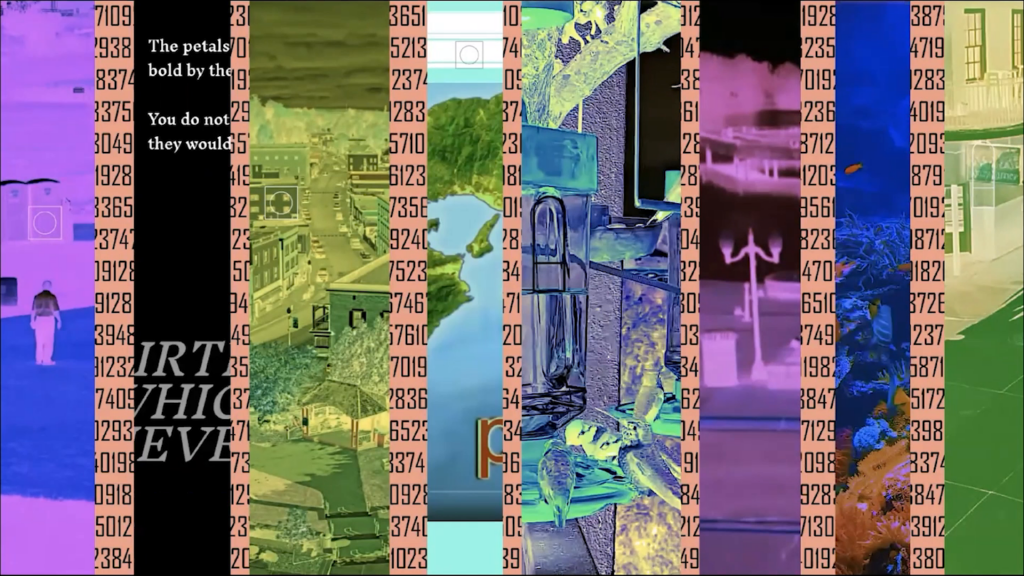
So Cyber Soldiers in Cyber Houses, actually, the piece itself takes place in a future time after a sort of 9/11 cyber-esque attack. And so this newly-created government agency is mandating country-wide cyber surveillance. And so the player has to work against the clock to clear all sixty-five levels of their house from planted bugs, surveillance cameras, microphones, and net surveillance. And so they are guided through thirty levels by two AI house helpers as characters. And I worked with Athena [Husek?], programmer extraordinaire, who is also in her Master’s program at NYU to create this project.
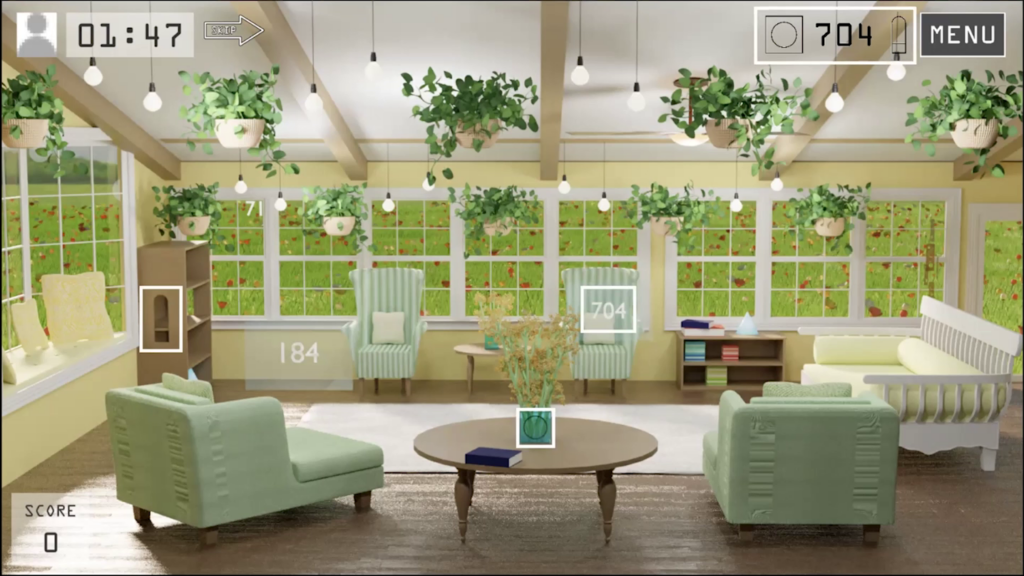
And so Cyber Soldiers in Cyber Houses is an “I spy” game. And the player has to find all the bugs planted in their house with the help of the two AI narrators, who have nebulous loyalties. And so how to play is explained through the first five levels of the game, and here we have the example of the fourth level, I believe. And so the bugs are a camera, a microphone, and a code. And the code changes with each room, and you can check it in this key area. The player simply need to click on the correct bug in order to find it. And if the timer reaches zero it’s an automatic game over.
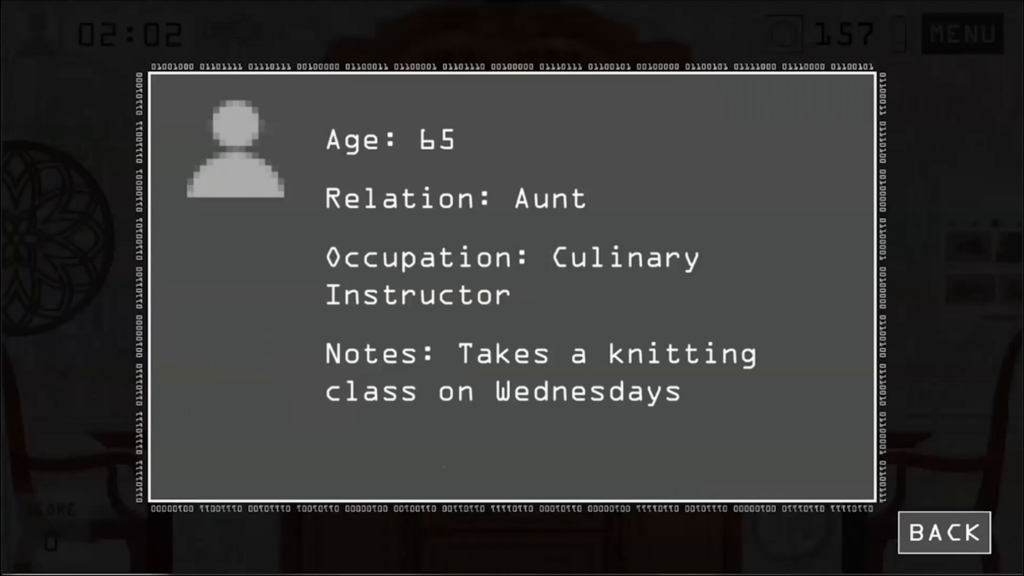
The player can of course skip the level, however this is the person of interest’s profile, and each room is attached to a person of interest. If the player skips a level without finding the bug, then there’s a chance that they’ve compromised the person of interest. And compromising the person of interest adds to the score. Essentially, the player wants to get to the end of the game with the lowest possible score. And the scores and the player’s name get sent to a database afterwards at the end of the game, where players can compare their scores.
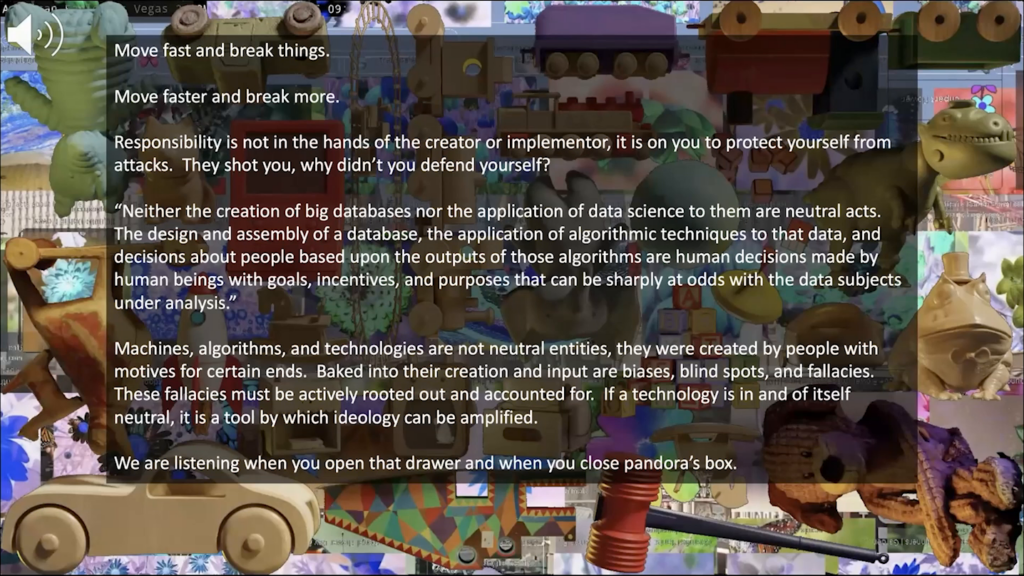
And so all of this is happening while the two AIs talk sort of at the player. And you’ll see in this sort of text-to-voice narration that whenever their voices echo, that is a direct quote from the research, as well as they also give hints sometimes in the narration. So I’ll play some of that for you right now.
[The following is delivered by alternating male and female computerized voices. The quoted paragraph echoes as mentioned above.]
Move fast and break things.
Move faster and break more.
Responsibility is not in the hands of the creator or implementor, it is on you to protect yourself from attacks. They shot you, why didn’t you defend yourself?
Neither the creation of big databases nor the application of data science to them are neutral acts. The design and assembly of a database, the application of algorithmic techniques to that data, and decisions about people based upon the outputs of those algorithms are human decisions made by human beings with goals, incentives, and purposes that can be sharply at odds with the data subjects under analysis.Machines, algorithms, and technologies are not neutral entities, they were created by people with motives for certain ends. Baked into their creation and input are biases, blind spots, and fallacies. These fallacies must be actively rooted out and accounted for. If a technology is in and of itself neutral, it is a tool by which ideology can be amplified.
We are listening when you open that drawer and when you close pandora’s box.
presentation slide [quoted paragraph from Big Data and the Future for Privacy]
So it’s a relatively simple premise but I think the simplicity really allows for conceptual cohesion. And the game was made using Blender, Photoshop, Audition, found footage, imagery, audio, and was programmed with Unity. Most of the content is found within the AI character narration. However in the visual design, as the player continues through the levels the rooms become less and less literal, breaking from the traditional conception of the home as a physical space and embracing the idea of the home as including a nebulous digital cyberspace, really leaning into that futuristic sci-fi absurdist genre that I’ve been finding myself in lately.
And so the difficulty of the levels also increases as the player continues. How therefore do you hide on the Internet, where nothing disappears? Rather than making the bugs harder to find by hiding them and trying to erase their presence, the Internet strategy is to inundate the player with an excess of information. Bury the bugs underneath more and more outrageous information to overload the amount of information given to the viewer. To exhaust and distract rather than to hide. So I think one of the strengths of Shall Make, Shall Be in creating games about the amendments, and what drew me to this project, is that laws are meant to be lived in, and they must clash against reality to test their validity. And I think games are a fun way to provide that.
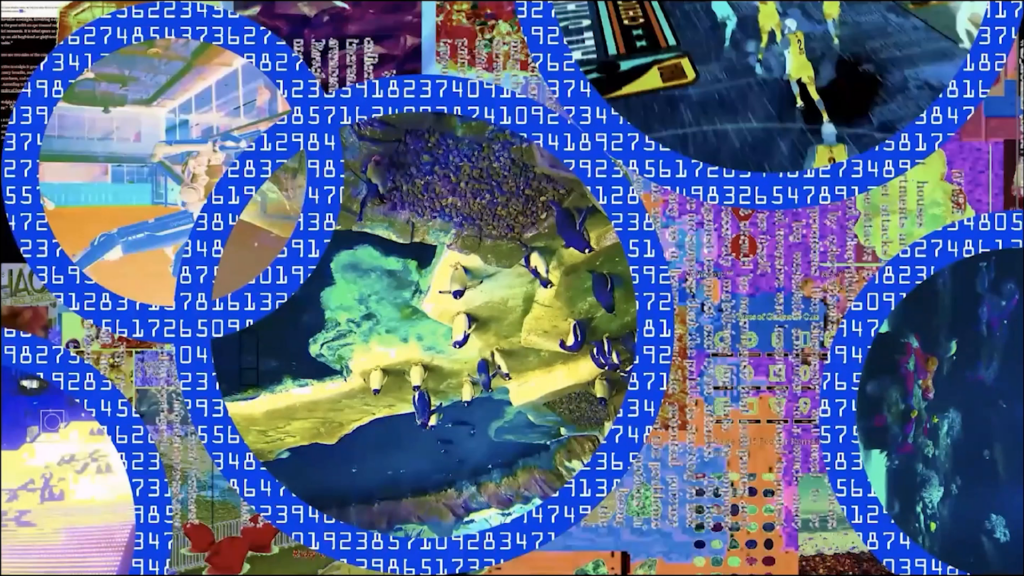
And also a way of game structure parallels sort of socioeconomic structure, creating structures and rules in games mimics superstructures of any place—both government, industry, and military. Games inherently deal with the viewer’s agency. And the game makers build a system in which the viewer interacts. Not just hard rules but also reward systems that push players to react a certain way. I think the connection between game systems with the amendments is an extremely poignant one.
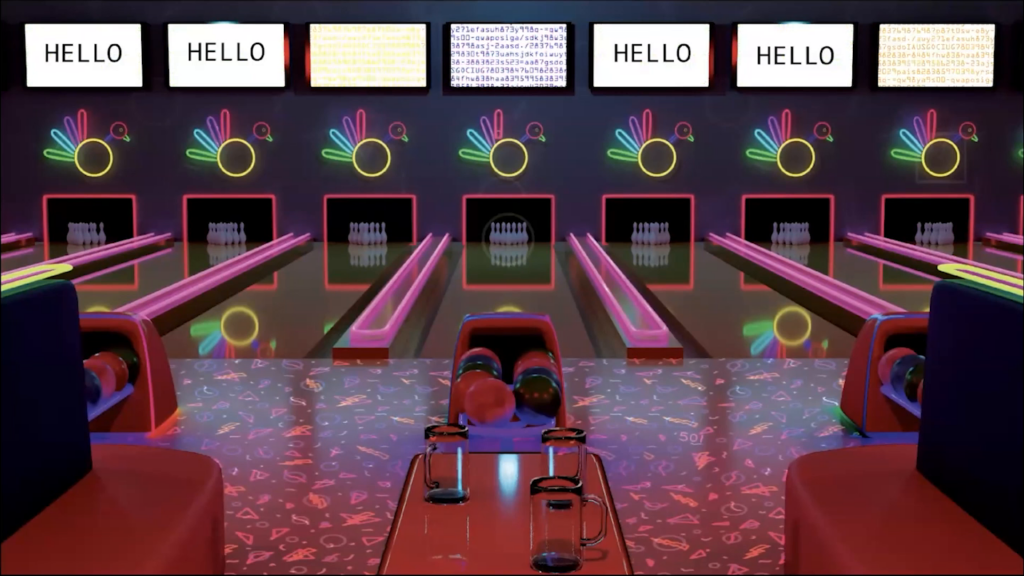
And so I come from an art background rather than a game making background, so I shouldn’t take for granted how immersive a game is in getting audiences to interact with concepts. And because I come from an art background I think in the past my focus was less about making the game fun and more about expressing conceptual ideas. But I think this project was a good way to focus a little more on the actual game mechanic.
So, thank you everyone for listening. That’s all I have.
